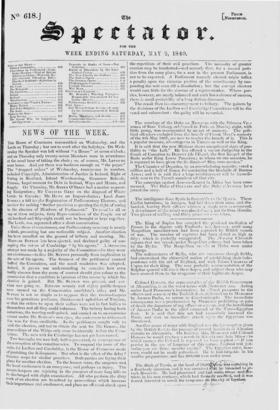NEWS OF THE WEEK.
THE House of Commons reassembled on Wednesday, and the Lords on Thursday ; but not to work after the holydays. On Wed- nesday the Speaker was left without "a House" at seven o'clock ; and on Thursday only twenty-seven Members were in attendance at the usual hour of taking the chair ; so, of course, Mr. LEFF:N*11B went home. And yet there was business enough on " the paper." The "dropped orders" of Wednesday, twenty-one in number, included Copyright, Administration of Justice in Ireland, Right of Voting in Scotland, Inland Warehousing, Grammar Schools, Prisons,. Imprisonment for Debt in Ireland, Ways and Means, and Supply. On Thursday, Mr. SMITH O'BRIEN had a motion respect- ing Emigration ; Sir CILABLES GREY on the disposal of Waste Lands in Canada ; Mr. Humn on Import-duties ; Lord JOHN RUSSELL a bill for,the Registration of Parliamentary Electors, and anther for making " further provision respecting the right of voting in the election of Members of Parliament." To consider all or any of these subjects, forty Representatives of the People out of six hundred and fifty-eight could not be brought or kept together. The Lords, too, separated after a short conversation.
Under these circumstances, our Parliamentary summary is nearly a blank, presenting but one noticeable subject. Another election has been annulled on the, ground of bribery and treating. Mr. MANNI:ES SUTTON has been ejected, and declared guilty of cor- rupting the voters of Cambridge " by his agents." A strenuous attempt was made by a majority of the Committee—fbr they were not unanimous—to free MT. SUTTON personally from implication in the acts of his agents. The firmness of the petitioners' counsel baffled the Committee, and the usual resolution A'aS adopted. Indeed, it passes our understanding to conceive how even bodily absence from the scene of contest should give colonr to the aSsumption that a candidate is ignorant of the means by which his election is gained. But Mr. SUTTON was prs.sent, and saw what was going on. Between seventy and eight■,- public-houses were opened on the Conservative candidate's side; and Mr. SUTTON is Ilet SO simple as to suppose that the tavern-keepers were his gratuitous partisans, disinterested upholders of Toryism, or that the orders to open their cellars were not in fact bribes to themselves and all they could influence. The bribery having been notorious, the treating undiguised, and carried on to an enormous extent under Mr. SUTTON'S own eyes, the endeavour to whitewash 1,hu was far from creditable. As the petitioners sought only to void the election, and not to obtain the seat for Mr. GIBSON, the Proceedings of the Whigs only came incidentally befbre the Com- mittee. Tito new writ for Cambridge has not yet been moved.
Two boroughs are now 4Snly half-represented, in consequence of the corruption of the constituencies. To suspend the issue of the writs for Ludlow and Cambridge, is the House of Commons mode of punishing the delinquents. But what is the effect of the delay ? Greater scope for similar practices. Both parties are laying their plans for another election. To the honest voter, the suspense and the local excitement is an annoyance, and perhaps an injury. The tavern-keepers are rejoicing in the prospect of more long bills to be discharged with slight examination. All who perfbrm the dirty work of an election are benefited by proceedings which increase their importance and emolument, and place no effixtual check upon the repetition of their evil practices. The necessity of greater caution may be inculcated—and scarcely that, for a second peti- tion from the same place, for a seat in the present Parliament, is not to be expected. A Parliament recently elected might inflict a penalty upon the virtuous portion of the constituency by sus- pending the writ even till a dissolution ; but the corrupt electors would care little for the absence of a representative. Where par- ties, however, are nearly balanced and each has a chance of success, there is small probability of, a long disfranehisement.
The result then is—encouragement to bribery. The gainers by the decisions of the Ludlow and Cambridge Committees will be the venal and subservient : the guilty will be rewarded.


























